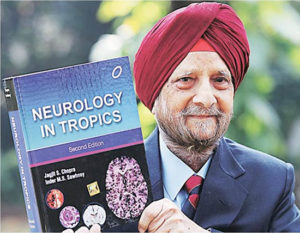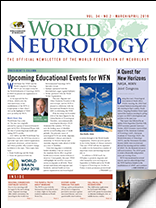(1935-2019)
By Prof. Inder M.S. Sawhney, MD, DM, FRCP, MNAMS, FIAN; Prof. Vijay K. Kak, MS, FRCS, FRCSE, FAMS, FIAMS, FIHE and Prof. Sudesh PrabhakarMD, DM, FIAN
The World Federation of Neurology (WFN) honored Prof. Jagjit Singh Chopra (JSC) with the Lifetime Achievement Award in September 2017 at Kyoto, Japan. His achievements were applauded on the world stage in his absence, as he could not attend the meeting due to a disabling stroke.

Prof. Chopra displaying the latest edition of the book, “Neurology in Tropics,” edited by him.
He was selected as Secretary General of the World Congress of Neurology (WCN), which was organized successfully in 1989 at New Delhi. He has the distinction of being associated with the WFN since 1985 in various capacities, including co-chair of the Finance Committee, vice chair of the research group on organization and delivery of neurological services and editor-in-chief of World Neurology from 1999-2009.
Prof. Chopra was the first Indian neurologist to be nominated for the post of WFN president in 2005. He breathed his last Jan. 18, 2019, in Chandigarh, India, plunging the neurology community worldwide, his friends, and colleagues into gloom with the loss of a distinguished neurologist.
JSC was born June 15, 1935, in Lahore (now Pakistan). He received his early school education in Fazilka and completed his medical degree at the Government Medical College, Patiala (Punjab University) in 1959. He proceeded to the U.K. after one year’s house job at Rajindra Hospital in Patiala, and worked at the Royal Belfast Hospital for Sick Children, Belfast, and later in the departments of medicine and neurology at the Royal Victoria Hospital in Belfast.
He was trained under neurology stalwarts such as Drs. R.S. Allison, JHD Miller, L.J. Hurwitz and M.W. Swallow. He passed the examination for diploma in child health from Royal College of Physicians in 1962 in London, and obtained MRCP (Edinburgh) with specialization in neurology in 1963. He was the youngest Indian to be awarded FRCP (Edinburgh) in 1969. He was awarded a PhD by the Queen’s University in 1967 in Belfast for extensive research on diabetic neuropathy.
Toward the end of his U.K. sojourn, JSC met his former teacher, Dr. P.N. Chuttani, in an elevator in London. In the brief encounter, JSC expressed his desire to return to India.
“Boy, go and pack your bags. I have given you the job,” said Dr. Chuttani to his bright student. That is how Dr. Chopra joined the Postgraduate Institute of Medical Education and Research (PGIMER) in Chandigarh, in 1968, as assistant professor of neurology, and gradually rose to professor of neurology until his superannuation in June 1995.
Neurology Department
JSC was instrumental in setting up a world-class department of neurology and research laboratory at PGIMER and dedicated his life to establishing model clinical, teaching, and research facilities in the department. He started the DM (neurology) training program at PGIMER and trained several super-specialists in neurology, most of whom are heading departments at various establishments in India and abroad. He also trained many specialists in neurology for the Armed Forces of India.
Neurology training during his tenure was rigorous. None of his trainees can forget the teaching at Saturday grand rounds, where the emphasis used to be on clinical neurology. He was a man who appeared tough in his professional and academic dealings, but was endowed with a kind heart and always went the extra mile to help everyone, especially his students. He had the reputation of being a hard taskmaster, a strict disciplinarian, and an immaculate clinician.
Prof. Chopra retired in 1995 but continued as professor emeritus at PGIMER. He was also selected as national lecturer by University Grants Commission, and lectured at various medical institutions across the country. The National Academy of Medical Sciences (India), New Delhi, also honored him with emeritus professorship. He was awarded the Dr. B.C. Roy National Award as an eminent medical teacher.
Research
JSC has contributed immensely in the field of neurosciences research and education. He has conducted research in muscle diseases, peripheral nerves, young strokes, and infections of the nervous system, and has guided over a dozen PhD theses. He has published nearly 250 scientific research papers in journals of national and international repute.
He was editor-in-chief for “Text Book of Neurology,” and “Neurology India,” a publication of the Neurological Society of India, for six years. He has written about 50 chapters in various books and monographs, published in India and abroad. He served on the editorial board of several journals. Age did not dampen his enthusiasm for neurology. He had a firm belief that there was no limit to gaining knowledge and giving it back to the world. He co-edited “Neurology in Tropics” in his 80s and was a force behind meeting the deadlines for its publication.
JSC was the founder president of Indian Academy of Neurology (1993-1994), his brainchild, and past president of the Neurological Society of India (2003). He had been a member of the executive committee of the International Federation of Clinical Neurophysiology, selected as an honorary member of the American Academy of Neurology and the American Neurological Association, member of the London Medical Society, Association of British Neurologists, and Ulster Medical Society. He was elected fellow of the Medical Society of London and the National Academy of Medical Sciences (India), New Delhi.
JSC has been a member of the advisory groups/panels of medical education and training of National Board of Examinations; Indian Council of Medical Research; NIHMANS, Bangalore; Indian Council of Child Welfare, Chandigarh; and the department of biotechnology for the government of India. He had been a member of several international scientific program advisory committees. He was nominated as a senator to the Baba Farid University of Health Sciences, Faridkot, Punjab, by the governor of Punjab.
Awards
JSC had been the recipient of several awards and orations, including the Ninth Amrut Modi Research Award, Pelipu Perindevi Suriya Award of Pharmacological Society of India, MN Sen Oration Award of ICMR, Life Time Achievement Award in Neurosciences, Madras Neuro Trust, Dr. M.S. Sanjeev Rao Oration, Dr. R.S. Allison Oration, Belfast, U.K., Baldev Singh Orations, NSI and National Academy of Medical Sciences, New Delhi, Vishist Chikitsha Gold Medal by Association of Chest Physicians of India, award by Pan Arab Union of Neurological Societies, Emirates Medical Association and Emirates Neurological Society and Emirates League Against Epilepsy, and awards from Pakistan Neurological Society and Epilepsy Association of Pakistan. He was awarded the Parman Patra by S. Prakash Singh Badal, chief minister, Punjab in 2007, and Padma Bhushan (the third highest national award) by the president of India in 2008.
JSC was happily married to Amarjit Chopra, who passed away over a year ago. They have a daughter and a son. Dr. Brinder Chopra received her MD in clinical biochemistry from Punjab University, and is currently working as associate professor of biochemistry at Gian Sagar Institute of Medical Sciences, Patiala. She is married to Dr. Sukhpreet Singh, MS (general surgery), and they have two children.
Their son, Dr. Harvin Chopra, is trained in radiodiagnosis with an MD from Medical University of Innsbruck, Austria, and an MD from MMU, Mullana. He is married to Natasha.
JSC was a brilliant organizer, an excellent clinician, and mentor to a large number of neurologists all over the world. Prof. Chopra will be immensely missed in the world of neurology and will live forever in the hearts of his students and colleagues. We owe him a debt of gratitude for his contribution to neurosciences and for his never-ending faith in the potential of his students. •
Prof. Sawhney is the honorary professor of neurology at Swansea University, and consultant neurologist and clinical director neurosciences at the ABM University Health Board, Morriston Hospital Swansea, U.K. Prof. Kak is emeritus professor of neurosurgery at PGIMER in Chandigarh, former director-principal of Government Medical College in Chandigarh, and secretary medical education and research at the Chandigarh Administration, India. Prof. Prabhakar is the former professor and head of the department of neurology, Postgraduate Institute of Medical Education & Research in Chandigarh, India.
References
Kak VK, Sawhney IMS. In Memorium – Prof. JS Chopra. Neurology India 2019; 67(1): 346-349.
Sawhney IMS, Kak VK. In Memorium – Prof JS Chopra. Annals of Indian Academy of Neurology 2019; 22 (2): 259-260.
